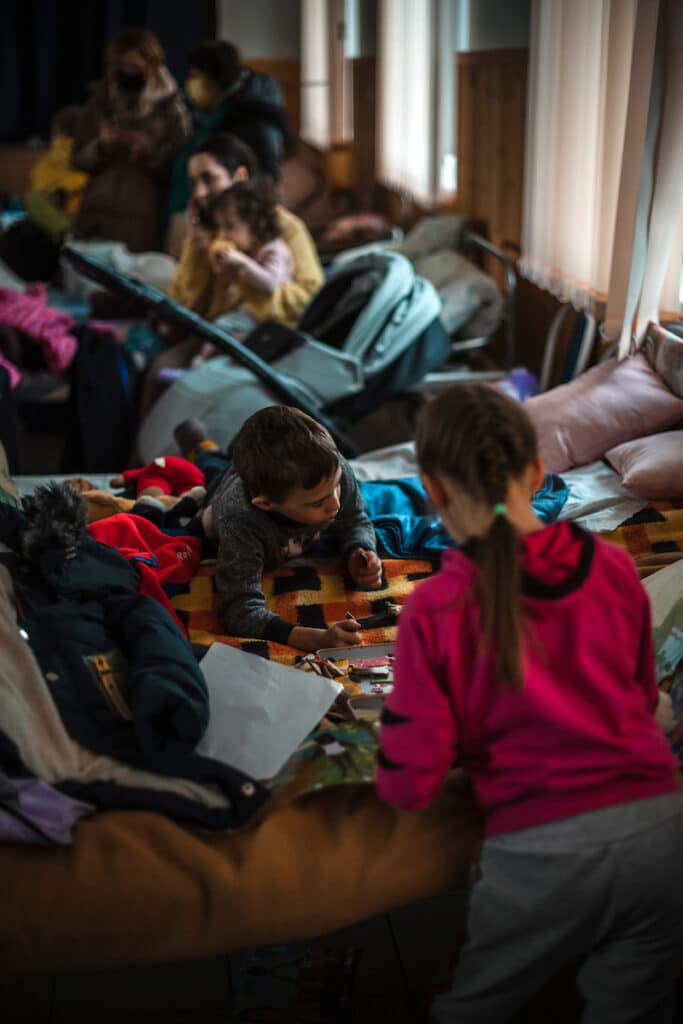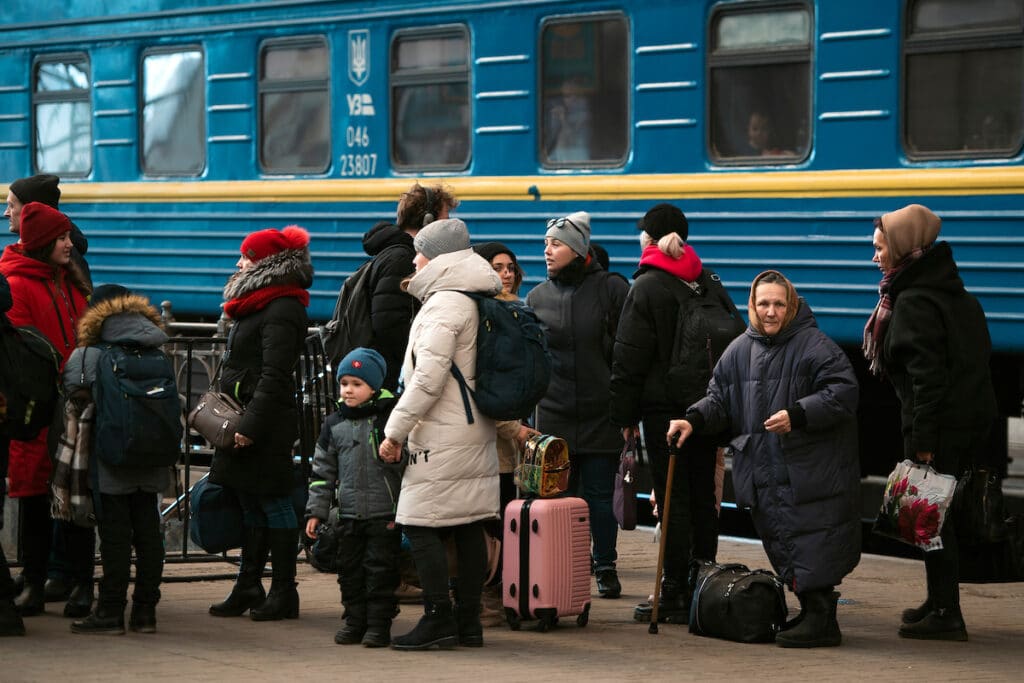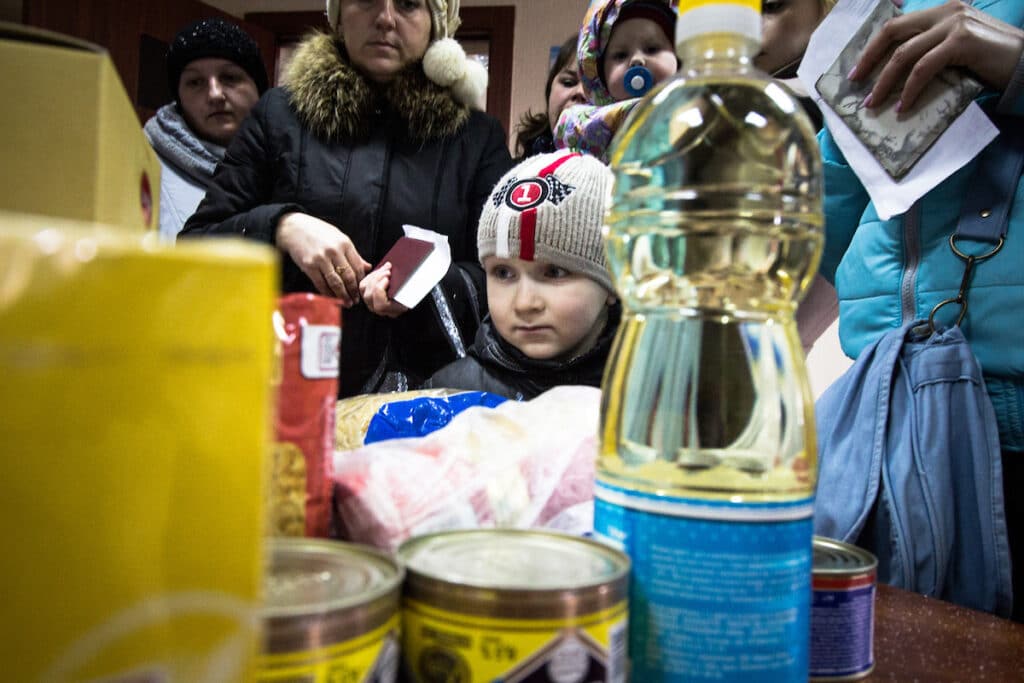UCC appeal tops $1 million to help Ukrainians find safety, inside and away from their country
As Russia’s war on Ukraine rages on, so does the suffering of the country’s people. And they have been leaving their homes in record numbers. Donors in the United Church of Christ see them and have stepped up to send help.

The response to the UCC’s emergency appeal for Ukraine has been unprecedented. Some 3,700 donors have given more than $1 million to the effort, launched days after Russia attacked Ukraine on Feb. 24. The $1,073,208 in gifts as of April 5 may be the church’s largest international relief effort ever.
As of April 6, more than 4.3 million Ukrainians have fled the country, the majority of them, 2.5 million, taking refuge in Poland, with others in Romania, Hungary, Moldova and Slovakia.
The United Nations High Commissioner for Refugees said the war on Ukraine has created the worst refugee crisis since World War II. Added to that are more than 7.1 million people who remain displaced inside the war-torn country.
How gifts help
Gifts to the UCC appeal will be sent to partners in Europe — through the ecumenical ACT Alliance — to help tend to the needs of those people.
“Our participation in the ACT Alliance means we are connected to a global network of church or church-related humanitarian response organizations,” said Josh Baird, team leader of Global H.O.P.E. “No one organization had the capacity to welcome the influx of refugees this conflict has driven or to receive and distribute the massive food and other goods needed over such an expansive geographic area.”
Baird said three large ACT members — Lutheran World Federation, Hungarian Interchurch Aid (HIA) and Swiss Church Aid — are enabling the response of more than a dozen smaller organizations. Many of them are regional clusters of congregations in Poland, Hungary and the other countries receiving refugees. They are providing shelter, food, clothes, transportation, medical, psychosocial and spiritual care.
Needs increase outside Ukraine
Baird’s team, part of Wider Church Ministries, has regular check-in calls with the ACT Alliance. Partners on the ground are seeing more people, with fewer resources, as the conflict rages on.

“It was described in one call that the first refugees came in cars with suitcases and cash,” Baird said. “They typically only needed lodging for a night, often could pay for it, and then were off to a preplanned destination, such as with family or friends living elsewhere in Europe.
“After several days or maybe a week, the refugees were much more likely to be arriving by public transit (bus, train) or on foot. They had fewer suitcases and resources. Most needed lodging for several nights and few had the cash to pay for it. Many still had a further destination ahead of them but they began to need assistance getting there.
“Within a couple of weeks, arriving refugees carried much less, needed shelter for longer periods of time, and more often than not did not have a specific destination they were trying to reach.”
Challenges inside Ukraine
Inside Ukraine, one of the larger partners is supporting around 100 shelters and activity centers in the western part of the country. These assist people forced from their homes but unwilling or unable to leave Ukraine. Baird said this includes a high number of seniors, as well as women with children whose husbands are fighting in the war.

Right now, Baird said, the UCC partners are trying to prepare for a surge in internally displaced Ukrainians as the increase in violence moves east. The Russian strikes are also making supply runs from neighboring countries more difficult.
“Between the various checkpoints and the condition of the roads themselves, it is incredibly difficult to deliver goods where they are needed,” he said, noting that runs that used to take a few hours are now taking more than a day.
Where next?
A current challenge for the organizations is anticipating where refugees will move next. “We are beginning to hear of needs in countries beyond Ukraine’s immediate neighbors as people continue to move, but that has yet to materialize into specific information or requests,” Baird said.
For example, in Moldova — a country of 2.5 million where more than 95,000 people are taking refuge — “they are largely being housed by faith communities, in church buildings and in individual homes, where people threw open their doors in welcome. It is a generous response that is not sustainable.”
Due to the generosity of UCC donors, the church is making plans to respond in the long term. All the money sent to the Ukraine appeal will be used to assist people who are fleeing the war now and after the conflict. No funds are used to cover UCC administrative costs.
“We are a part of a collaborative humanitarian response,” said the Rev. Karen Georgia Thompson, associate general minister of Wider Church Ministries and Operations. “We are leveraging our resources for the greater good, contributing in a protracted way to ensure we are able to be present as additional needs emerge.”
Content on ucc.org is copyrighted by the National Setting of the United Church of Christ and may be only shared according to the guidelines outlined here.
Related News
A Moment of Silence
The weekend news was alarming. Two students shot and killed with 9 injured at Brown University...
Read MoreIn hope-filled worship service, UCC and United Church of Canada celebrate full communion past and future
On Saturday, Dec. 13, many from the United Church of Christ (UCC) and the United Church of...
Read More‘A Gift of God to the World:’ Christmas greetings from the General Minister and President
As Christmas quickly approaches, UCC General Minister and President/CEO the Rev. Karen Georgia...
Read More

